Much like Sarah Polley's Take This Waltz, Joe Wright's Anna Karenina suffers from the misfortune of dominant ideology and blogger influence on populist culture. In a world guided by an insular, overly solipsistic male voice, regardless of the many laws and superficial shifts in gender roles that have transpired over the last 100 years, female sexuality and passion are still chastised and feared. Of course, no one would ever verbalize this assertion directly, instead referring to the protagonists of these films as selfish, or dismissing the directors, both of whom put more thought, sincerity and intricacy into their works than those that are routinely rewarded for reiterating the status quo, as "pretentious" or "indulgent." But in adapting Tolstoy's larger-than-life Anna Karenina (a tale about love, politics, idealism, passion and the death of an era), Joe Wright was less indulgent than he was driven by impressionism and the nature of cinema as an emotional experience beyond just the sheer narrative component. Anna's (Keira Knightley) similar "indulgence," being the passion she has for Vronsky (Aaron Taylor-Johnson), despite being married to successful politician Karenin (Jude Law), is that of emotion, desire and a romanticized, epic idea of what love is. How love is presented fragments and distorts throughout the film. Karenin's patience and understanding for his wife's carnal indulgence is astonishing in itself, having the responsibility and calmness necessary for someone whose perspective on love is that of compassion and mutual respect, rather than externalized whimsy. Similarly, Kitty (Alicia Vikander), the sister of Anna's sister-in-law, Dolly (Kelly Macdonald), has a romantic, idealized concept of amour, desperately wanting Vronsky to sweep her off her feet, but receives a dose of reality when her suitor doesn't reciprocate her affections, leaving her to realize the value of a relationship with someone like Levin (Domhnall Gleeson), a political idealist and worker whose dedication and overall goodness would easily provide a life of happiness that might compensate for the lack of sexual connection. Though none of these scenarios are ideal, much as no set of politics are perfect — politics being represented more so by style than verbal indicators in this version — it's the ongoing quest of each individual that makes everything inspiring and ultimately human. Wright's style, which places the oppressive, all-seeing judgemental eye of society inside a theatre, shifting and manoeuvring around the actors walking between scenes, posits the city and upper class as a constant stage and performance where the workers move tirelessly around in the background in unison, making life work for those of significance. This style reflects the politics of the time and the death of an era, just as the sweet natured Levin is kept outside of the theatre, for the most part, working with the people towards a different future where he and Kitty can experience the idea of love as best they, or really anybody, can. And while some of the shifts between highly choreographed set pieces and slower, theatrical moments of introspection can be slightly jarring, the overall risk and scope of Wright's original vision is invigorating and compelling, featuring stunning imagery and aesthetic brilliance at every turn, pushing the boundaries of traditionalist cinema. It's just a shame that these risks have been categorized and dismissed by the many men distracted by the idea that our hero, or antihero, is a woman that dare behaves like anything other than a kept geisha that turns into a chaste mother the second a wedding band suffocates her vitality. Included with the Blu-Ray are a series of short supplements on the adaptation, costumes and Knightley's performance, discussing the nature of love and blending of '50s couture with 19th Century wardrobes.
(Alliance)Anna Karenina [Blu-Ray]
Joe Wright

BY Robert BellPublished Feb 21, 2013